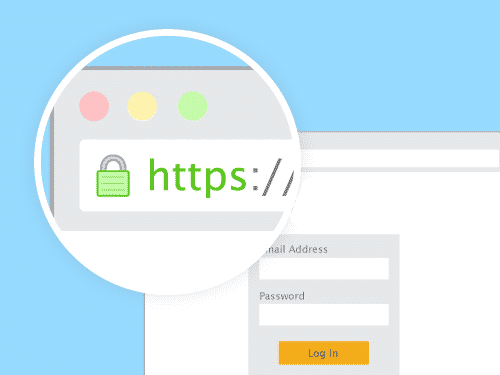
Let’s face it: The internet is a creepy place. With all the personal information we make available online, there are plenty of opportunities for hackers to get their grimy hands on it—and that’s not even accounting for the prevalence of bots and crawlers that trawl the web at all hours. In this article, we’ll explore how using HTTPS to secure your website helps Google see you as a trustworthy site instead of a cesspool of spammy pages that can be indexed and crawled with ease. We must not forget that search engines are algorithms driven by data. Sites with limited or unverifiable information will likely be downgraded by search engines (i.e., anything that looks suspicious). Anyone can give false information about their business, so Google also takes into consideration whether or not websites have appropriate contact details like an address, phone number, and/or email address in order to validate their authenticity and trustworthiness as an entity.
What is HTTPS and how does it protect website data?
The internet runs on hypertext transfer protocol (HTTP). This protocol enables a connection to be made between a user’s computer and a remote server. The server then retrieves the information that the user is looking for, and then sends it back to them. This exchange of data is not secure, which is why using HTTPS instead encrypts the exchange of data to prevent unauthorized users from accessing it. HTTPS is a communications protocol that is widely used on the web for things like login pages, ecommerce transactions, and other sensitive pages where users enter sensitive information, like credit card numbers, usernames, passwords, etc. HTTPS works by using a system of digital certificates to verify the identities of the website and user. If a website is secured by HTTPS, a padlock icon will appear in the browser’s address bar indicating that the website is verified to be legitimate and trusted.
How does HTTPS benefit SEO?
The biggest SEO benefit associated with HTTPS is the increase in trust and authority that Google places on your website. In fact, Google has actually confirmed that they give a ranking boost to websites that are HTTPS-enabled. And while the exact figures are unknown, there is speculation that this may be due to the increase in website engagement and/or page-load speed. What we do know is that security is crucial for both users and search engines alike. And with most users coming to a website expecting an added level of security and privacy, using an HTTPS connection makes total sense. In addition to boosting site authority, the switch to HTTPS can actually boost the conversion rate of your website. In fact, it can even lead to an extra $8,000 in sales per month for ecommerce sites. So, it’s not surprising that the majority of online companies have made the switch to HTTPS in recent years.
Google’s ongoing war on fake websites and spam
Google’s mission is to connect people to the information they need, when they need it. To this end, the company strives to keep their search engine as clean as possible by filtering out spammy websites that exist only to collect user information and profit from it. These types of sites are often built by “black hat” SEO practitioners who employ unethical techniques to get their sites to the top of the SERPs. They are built to trick Google into indexing them and ranking them higher than they would otherwise. These fake websites and spammy pages might look pretty and seem legitimate, but they are not trustworthy. In fact, Google actively penalizes websites with low-quality content and poor user experience in an effort to push these sites out of the SERPs completely.
Google ranking factor: Site Security
SEO professionals and marketers have been searching for ways to boost SEO for years and one of the best ways to improve your website’s SEO and ranking is to implement HTTPS. This will help your website rank higher in Google because Google ranks websites that have SSL/TLS encryption higher in the SERPs. With the increase in cyber hacks and identity thefts people are searching for websites that use SSL/TLS encryption. If your website is not using SSL/TLS encryption then you are losing potential customers. With SSL/TLS encryption on your website you will be able to reassure your visitors that their information is safe when they are on your website, and they will know that you are trustworthy.
Google ranking factor: HTTPS-Only API
Google also rewards websites that only allow HTTPS connections to access their API. This means that you can only view the content on a certain page or view the code behind your site if you’re on a page that is HTTPS-enabled. If a page is HTTP-only, you will not be able to access that information, which is why many developers make a point of only using HTTPS for their API pages. If you’re a developer, you may find that this is a bit limiting. After all, it can be hard to create an API that can only be accessed over HTTPS. But if you’re a blogger or a content creator who relies on third-party widgets, like a Disqus comment box, you may find that you need to turn off your API over HTTP so that you can keep your content safe and secure.
Google ranking factor: SSL Certificate Authority Practices
Any certificate authority (CA) that issues SSL certificates like DV SSL, cheap Wildcard SSL Certificate, Multi-Domain SAN, and Multi-Domain Wildcard SSL certificates for websites is responsible for ensuring that those websites are operating legitimately. If a CA finds any evidence of fraudulent activity or the CA suspects that a website has been compromised, they can revoke that site’s SSL certificate and shut it down. This can be extremely helpful for Google since it means that they don’t have to spend as much time looking over websites to make sure that they’re operating ethically. If a CA has revoked a site’s SSL certificate, the search engine will remove it from the index immediately. This means that the website will no longer show up in Google’s search results.
The Bottom Line
Simply put, HTTPS is the future of website security. It will be impossible to reach a good ranking in the SERPs without it. Your website can benefit from HTTPS in many ways. It can boost your conversion rate, allow you to reach more customers, and even boost your website’s authority in the SERPs. If you want to be taken seriously as a website owner, you need to make the switch to HTTPS. There’s simply no excuse not to do it. In fact, there are only reasons to make the switch as soon as possible. We hope you’ve enjoyed this article and discover ways to improve your website’s SEO performance. Remember to keep an eye on your Google Analytics data to track your progress.





